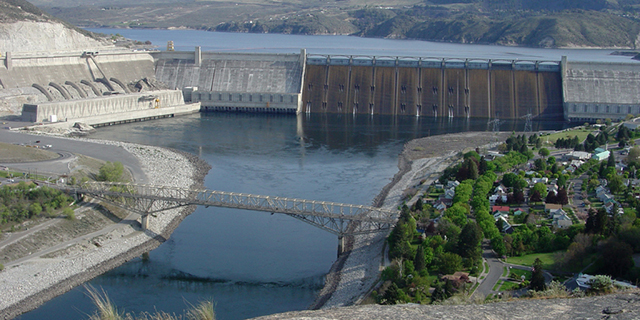Trump revokes Columbia River salmon agreement, stakeholders react
Published 3:00 pm Friday, June 13, 2025

- The Grand Coulee Dam on the Columbia River in Washington state is one of many federal dams that are part of in the U.S.-Canada treaty governing operation of the river system. (U.S. Geological Survey/Contributed Photo)
President Donald Trump has signed a presidential memorandum revoking the Biden administration’s “Restoring Healthy and Abundant Salmon, Steelhead and Other Native Fish Populations in the Columbia River Basin” memorandum, calling it a stop to “the green agenda” in the basin.
Trump’s action will likely be challenged in court and prompt plaintiffs to resume litigation that was stayed by Biden’s memorandum.
Trump’s new memorandum directs the U.S. secretaries of Energy, Interior and Commerce and assistant secretary of the Army For Civil Works to withdraw from agreements stemming from Biden’s “misguided” executive action, including the December 2023 memorandum of understanding filed in connection with related litigation.
The memorandum of understanding was between the federal government; the states of Oregon and Washington; the Nez Perce Tribe; the Confederated Tribes and Bands of the Yakama Nation; the Confederated Tribes of the Umatilla Indian Reservation; the Confederated Tribes of the Warm Springs Reservation and several environmental nongovernment organizations.
That agreement at the time was viewed as a pathway to breaching the four lower Snake River dams — Ice Harbor, Lower Monumental, Little Goose and Lower Granite.
“The specified agencies will coordinate with the Council on Environmental Quality to review and revise environmental review processes related to the matters in the MOU, save Federal funds, and withdraw from the MOU,” the White House said in a fact sheet.
Also according to the fact sheet:
• President Trump recognizes the importance of ensuring the future of wildlife populations in the Columbia River Basin, while also advancing the country’s energy creation to benefit the American public.
• The MOU required the Federal government to spend millions of dollars and comply with 36 pages of “onerous” commitments to dam operations on the Lower Snake River.
• Dam breaching would have resulted in reduced water supply to farmers, eliminated several shipping channels, had devastating impacts to agriculture, increased energy costs and eliminated recreational opportunities throughout the region.
• The dam breaches would have eliminated more than 3,000 megawatts of hydroelectric generating capacity — which is enough generation to power 2.5 million American homes.
Kurt Miller, executive director and CEO of the Northwest Public Power Association, called Trump’s decision a “necessary course correction.”
“We’re really pleased to see what was a really imbalanced agreement that threatened to harm millions of ag folks and electric utility customers going away,” Miller told the Capital Press.
Miller, then the executive director of Northwest RiverPartners, was one of several regional stakeholders acting as intervenor defendants who felt the federal mediation process under the Biden administration ignored agricultural and electrical utility interests.
“It was inevitable,” Miller said of Trump’s revocation of the memorandum. “The last administration forced this agreement through without any sort of collaboration. They left out perhaps the most important group of stakeholders: the people who would be harmed if the dams went away. … They literally met secretly, without telling us, and then dropped the (December 2023) announcement on us just barely before it went public. When we suggested changes, they accepted no changes. It was a really bad way to try to achieve something in this region, and I hope there’s a lesson learned there. We want some sort of durable resolution, but forcing it through without including our stakeholders, it wasn’t going to last.”
“It was a troublesome process on how it originated, and I’m really looking forward to being able to focus on building up salmon returns in other ways, outside of breaching the dams,” said Leslie Druffel, outreach director for the McGregor Co., and president of the farmer-led nonprofit Center for Sustainability and Working Rivers.
“We are pleased to see the Trump administration step back from any actions that might lead to the potential breaching of the lower Snake River dams,” said Michelle Hennings, executive director of the Washington Association of Wheat Growers. “The MOU was flawed from the beginning when it was negotiated in secret and excluded many of the communities that rely on the river system for power, transportation and recreation. We hope this is an opportunity to reset the conversation around fish and the dams and come up with solutions that benefit all stakeholders without doing irreparable harm to any.”
Legal challenges expected
Trump’s decision is at face value a “repudiation” of the commitments and agreements that allowed for a continued stay of the 2020 Columbia River System Operations biological opinion environmental impact statement litigation, recognized by Oregon U.S. Federal District Court Judge Michael Simon, said Darryll Olsen, board representative for the Columbia-Snake River Irrigators Association.
“The Trump Memorandum ensures that active litigation will resume, and the Tribes will be forced to bring to bare resource protections that they view are provided to them under the Stevens Treaties,” Olsen said. “This action will likely backfire on the Federal Administration, enraging the Tribes, environmental groups, and Oregon-Washington state elected leadership.”
The plaintiffs blasted Trump’s action.
“The Trump administration is turning its back on an unprecedented opportunity to support a thriving Columbia Basin — and ignoring the extinction crisis facing our salmon,” Amanda Goodin, senior attorney for Earthjustice, a nonprofit law firm with more than 200 lawyers who represent environmental groups, said in a press release. “Unfortunately, this short-sighted decision to renege on this important agreement is just the latest in a series of anti-government and anti-science actions coming from the Trump administration. This administration may be giving up on our salmon, but we will keep fighting to prevent extinction and realize win-win solutions for the region.”
“The Yakama Nation is deeply disappointed by this unilateral decision to terminate the Resilient Columbia Basin Agreement, particularly without prior consultation,” Gerald Lewis,Yakama Tribal Council chairman, said in a statement. “The federal government’s historic river management approach is unsustainable and will lead to salmon extinction. Courtroom battles cannot provide the innovative, holistic situations we need. This termination will severely disrupt vital fisheries restoration efforts, eliminate certainty for hydro operations and likely result in increased energy costs and regional instability.”
“I think there is a way forward here that doesn’t involve the courtroom,” Miller said.
He wonders if all the competing interests can get together to discuss solutions that don’t try to “destroy our critical hydro-infrastructure,” and said the public power association’s members want to discuss ways to support more tribal fishery operations and programs.
“Are the plaintiffs willing to look at something that doesn’t involve diminishing hydropower output or eliminating the dams?” he asked. “If they are, then I really believe there’s an opportunity to do something good.”
Trump’s decision doesn’t mean groups will stop trying to breach the dams, Druffel said.
“I think there’s better ways for all of us to spend money,” she said. “Lawyers come in handy when you really need them, but at the same time, I’d rather see us work on other avenues for the fish, honestly,” she said.





